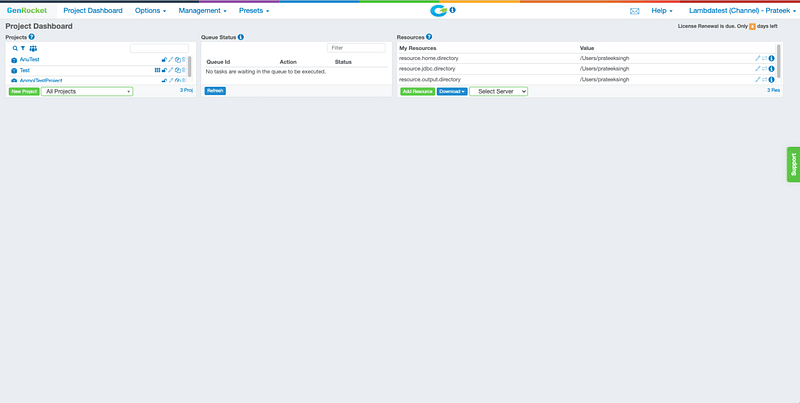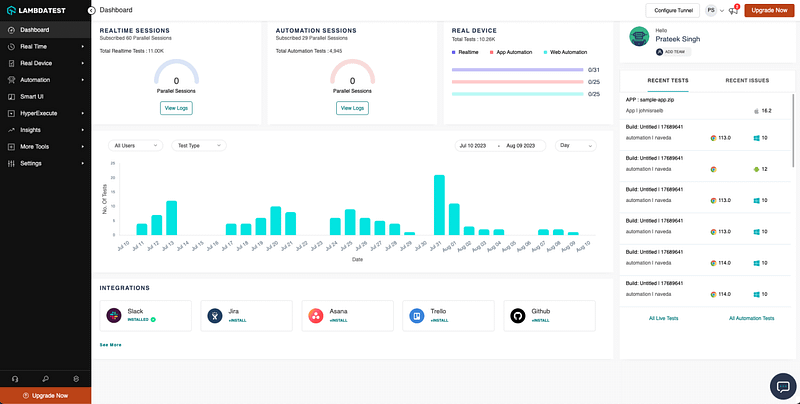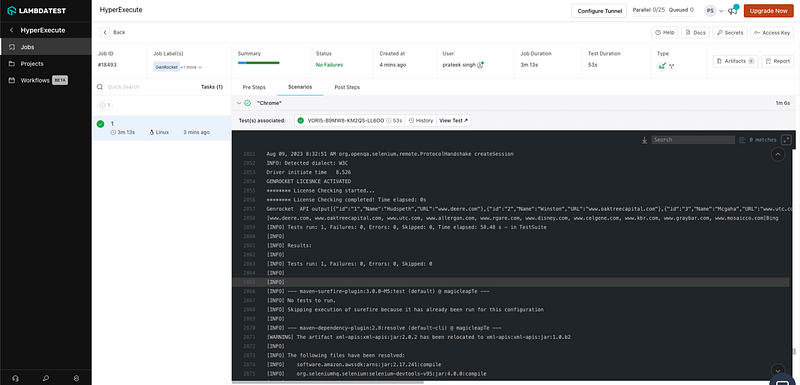Leveraging Synthetic Test Data Generation on HyperExecute With LambdaTest and GenRocket Integration
In software testing, improving efficiency and accuracy has always fueled innovation. As technology advances and software complexity grows, efficient testing processes become even more crucial. This is where the integration of LambdaTest’s HyperExecute with GenRocket comes into play, transforming how testing teams harness the potential of test data generation and execution.
GenRocket is a leading synthetic test data generation platform capable of creating a wide range of synthetic test data in large quantities. What sets GenRocket apart is its ability to generate this data without needing to access or analyze actual production data. Additionally, GenRocket offers seamless integration with various test automation, execution, and orchestration platforms currently available. This integration ensures smooth and efficient testing while maintaining data security and privacy.
HyperExecute, an AI-powered test orchestration and test execution platform, ensures software compatibility across various web browsers, while GenRocket excels at producing realistic test data. Together, these technologies significantly enhance the testing process, paving a new era of testing capabilities. This integration equips the QA teams with the tools to navigate software testing challenges with exceptional agility and insight.

Deep dive to learn about test automation, its uasage, types and also gain insights on how to get started with Sofftware automation testing
What is GenRocket?
GenRocket is a cloud-based platform for test data automation. It makes life easier for businesses by helping them create, customize, and control their test data effortlessly. Whether you’re gearing up for unit testing or speeding up your CI/CD pipeline, GenRocket’s got you covered with real-time synthetic test data and seamless integration with test automation.

One of the standout features of GenRocket is its remarkable versatility. It can create synthetic data, like names, addresses, numbers, and dates. This versatility makes it a valuable tool for testing different software parts. By generating this synthetic data, GenRocket assists software developers and testers in ensuring that their programs operate seamlessly and with precision.
Here are some of the features that make GenRocket stand out:
Versatile Synthetic Data Generation: GenRocket excels at creating a wide range of synthetic test data, including names, addresses, numbers, dates, and more. This versatility allows for comprehensive testing of various aspects of the software.
Realistic Make-Believe Data: The generated synthetic data closely mimics real-world data, ensuring that testing scenarios resemble actual usage conditions without compromising data privacy.
Privacy and Security: GenRocket operates independently of actual production data, providing a secure environment for testing without accessing sensitive or confidential information.
Scalability: The platform can generate large volumes of synthetic data, enabling efficient testing of scalability and performance under different conditions.
Integration Capabilities: GenRocket integrates with widespread test automation, execution, and orchestration platforms, enhancing the overall testing workflow and efficiency.
In this Selenium JavaScript for automation testing tutorial, as we deep dive into the basic concepts, explained the best practices and executed automation scripts with JavaScript on cloud-based Selenium Grid
HyperExecute Integration With GenRocket
HyperExecute is an AI-Powered test orchestration cloud platform, enabling test automation teams worldwide to achieve an accelerated time to market by providing JIT (Just-in-time) testing infrastructure that offers enhanced test execution speeds, smart test orchestration, detailed execution logs, and much more.

GenRocket uses a unique combination of technology called “hybrid architecture.” This means that the ideas and plans for the test data are created on the GenRocket cloud, but the actual data is in the user’s space, like their computer or server (behind their protective wall).
To make the test data, users need to have the GenRocket runtime. This is like a set of particular files (called JAR files) that must be installed on the computer or server where the data will be created. For example, this could be the user’s computer or a bigger server. With the GenRocket runtime setup, users can easily generate the necessary test data.
Through this integration, users will gain effortless access to GenRocket’s capabilities for generating the required synthetic test data in quantity and diversity. This integration empowers users to define authentic test data using GenRocket and then seamlessly automate the testing process with the aid of HyperExecute.

This collaboration delivers substantial customer advantages using both platforms, resulting in quicker and more comprehensive testing procedures. As a direct consequence, testing cycles will be notably shortened, contributing to an expedited pace of software delivery.
Learn why Python is the top choice for automation testing. This comprehensive tutorial provides a step-by-step guide to Python for automation testing to help you streamline your testing process
All in All!
In conclusion, LambdaTest’s HyperExecute and GenRocket integration offers users a straightforward solution for effective software testing. Users can easily create real-like test scenarios by seamlessly blending GenRocket’s synthetic test data generation capabilities. Through the streamlined automation facilitated by HyperExecute, the testing process becomes smoother. This new integration with GenRocket will significantly benefit you while maximizing your productivity.
Try our new GenRocket integration and share your thoughts on the LambdaTest Community. You can also contact us via our chat portal or at support@lambdatest.com.
